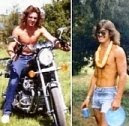 I liberated this
illustration from the depths of the infinite forbidden zone known as the notional environment of cyberspace. I
would give credit to its creator if I knew the identity, but, since I do not, I
simply will say, "thank you .... you do good work .... I like your work." It seems
to represent to me a creature whose name is Memory trying to find its way back
to its owner .... or whatever.
I liberated this
illustration from the depths of the infinite forbidden zone known as the notional environment of cyberspace. I
would give credit to its creator if I knew the identity, but, since I do not, I
simply will say, "thank you .... you do good work .... I like your work." It seems
to represent to me a creature whose name is Memory trying to find its way back
to its owner .... or whatever.
Memories light the corners of my mind
Rutger Hauer was a Dutch actor
and an environmentalist (although I think the role of environmentalist is the
more important of the two and should be noted first) who died in 2019 of
undisclosed causes at the age of 75. His most well-known role, many would
argue, was in the 1982 film, "Blade Runner," as the self-aware replicant Roy
Batty.
"Blade Runner" was an
adaptation of Philip K. Dick's 1968 science fiction novel, "Do Androids Dream of Electric
Sheep?" The film takes place in a dystopian future Los Angeles of 2019, in
which synthetic humans known as replicants are bio-engineered by a powerful corporation
to work at space colonies. When a fugitive group of advanced replicants led by
Batty escapes back to Earth, burnt-out police officer Rick Deckard agrees to
hunt them down.
Batty's body begins to fail as
the end of his lifespan nears -- planned obsolescence, you understand. As the film
draws toward its conclusion, he saves Deckard's life and, as he is dying, Batty
delivers a masterful monologue about his memories:
"I've seen things you people
wouldn't believe. Attack ships on fire off the shoulder of Orion. I watched
C-beams glitter in the dark near the Tannhäuser Gate. All those moments will be
lost in time, like tears in rain. Time to die."
The monologue had been
composed by screenwriter David Peoples and altered by Hauer. An
earlier version read: "I've known adventures, seen places you people will never
see, I've been Offworld and back .... frontiers! I've stood on the back deck of a
blinker bound for the Plutition Camps with sweat in my eyes watching stars
fight on the shoulder of Orion .... I've felt wind in my hair, riding test boats
off the black galaxies and seen an attack fleet burn like a match and disappear.
I've seen it, felt it ...."
The original script, before
Hauer's rewrite, was: "I've seen things .... seen things you little people
wouldn't believe. Attack ships on fire off the shoulder of Orion bright as
magnesium .... I rode on the back decks of a blinker and watched C-beams glitter
in the dark near the Tannhäuser Gate. All those moments .... they'll be gone."
Hauer said later that he "put
a knife" to the final lines to cut the "opera talk" and to show Batty
wanted to "make his mark on existence .... the replicant in the final
scene, by dying, shows Deckard what a real man is made of ...."
How many of us think similar
thoughts, I have no idea. In a self-centered way, I think about it frequently, of
how my memories -- the recollection of my experiences -- will be lost when I
die. At some point along the way, I began to understand it as one of the things
we all have in common. Our memories, I assume, disappear into oblivion when we depart our
lives on Earth. Our lives intermingle, but each and every one of us is an
entity onto itself .... onto ourself.
I guess in a sense of
finality, Hauer might be described as an editor with a sharp knife, an
environmentalist who put his money where his mouth was and an actor who could
bridge the distinction between a replicant and a very human being.
Watch the film and read the
novel, if you are so inclined and have not
already done so, and think about that final, brief soliloquy and your own
memories.
Perhaps, it is for the best
our memories fade into oblivion when our switch is flicked off .... but / but / but the simple thought of it is ever so annoying and frustrating ....















